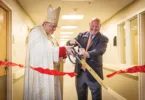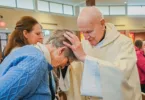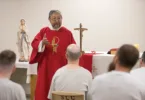It’s archdiocesan internal auditor Mike Horn’s job to make sure parishes have both
by Joe Bollig
joe.bollig@theleaven.org
KANSAS CITY, Kan. — “That’s the way we’ve always done it” is not a phrase Mike Horn likes to hear when he visits a parish.
That’s because Horn is the internal auditor for the Archdiocese of Kansas City in Kansas. And it’s his job to review the financial procedures and safeguards at parishes and other Catholic entities.
Another problematic sentence is: “Don’t you trust me?”
Trust is good, and you’ve got to have trust, said Horn. But when it comes to transparency and accountability with parish finances, “trust me” and “that’s the way we’ve always done it” don’t cut it.
Horn has been the archdiocesan internal auditor for a little more than a year. He’s on a three-year cycle to visit the parishes, schools and institutions of the archdiocese to review their financial statements and procedures for handling fiscal affairs. So far he’s visited 127 entities and has 37 yet to go.
As internal auditor, Horn reports to the audit committee of the Archdiocesan Finance Council. The council is comprised of Catholic laypeople, who are themselves accountants. Ultimately, both Horn and the committee are responsible to Archbishop Joseph F. Naumann.
“[Archbishop Naumann] brought the department to fruition because he saw the need for [fiscal] transparency,” said Horn.
Father John Riley, archdiocesan chancellor, is also a member of the audit committee.
“The audit committee provides oversight of the internal auditor — to see what he has done, what he is doing, who he is going to see in the next few months, and what are his findings,” said Father Riley.
“He lets us know what is going on in the parishes from a financial accounting and internal controls environment,” he continued. “And [the audit committee] sees if there are any red flags going up or any inconsistencies throughout the archdiocese as far as the parishes’ internal controls.”
Although most non-accountants are unfamiliar with the term “internal controls,” they are part of the daily life of every parish.
Internal controls are procedures used to ensure that effective safeguards are in place for the handling of cash, expenditures, receipts, and all other financial operations.
Controls prevent theft, reduce the temptation for theft, and increase trust and accountability through transparency.
“My responsibility is to go to the various archdiocesan entities — parishes, schools, whatever — and review financial statements and internal control procedures,” said Horn.
“The emphasis is on, more than anything, internal controls — making sure their internal controls are in good shape and they have procedures in place,” he said. “I’ll do different tests to see if those controls are in place and recommend various procedures they need to promote internal controls if they don’t, in fact, already have them.”
It’s difficult to provide an overall picture of where archdiocesan parishes are in regard to internal controls, said Horn, because what he’s seen has run the full spectrum — from very good to poor.
In larger parishes, a problem may arise in a club or ministry that has lax internal controls.
“If you go to a larger parish, it may have its offertory procedures in great shape, and great financial reporting, but it might have a scrip program that’s a mess,” said Horn. “It could be CYO or any other little parish organization [that’s] run very poorly, even if it’s in a parish in which most things are doing well.”
In small parishes where people wear many hats, problems may arise from a lack of staffing or training.
“In many aspects where you’re getting to the segregation of duties, the smaller parishes struggle because they don’t have the manpower,” said Horn. “They can’t afford to pay people. They often will pay a secretary — the only person they have on the payroll — and he or she also serves as the bookkeeper.”
In many cases, trust has been a substitute for good internal controls. Unfortunately, this trust has been violated at times in the past.
“Something as simple as the Sunday collection,” said Father Riley. “People think, ‘Who would ever steal money from the Sunday collection?’ Well, it’s happened, and sometimes it’s nearly impossible to detect.”
In addition to preventing theft, parishes should have good internal controls simply because they are the most effective and efficient way to manage their finances, he said. To help with that, the archdiocese has created a Parish Administrative Handbook, which provides quick access to archdiocesan guidelines on finance and record keeping.
“Pastors obviously have a lot to deal with, and to know this book inside and out is difficult,” said Father Riley.
“Generally speaking, pastors are doing things right. It’s not that we don’t trust our pastors, or our finance councils, or our parish staffs,” he continued. “We want to be a resource to help them become better and provide that disclosure and transparency to parishioners.”
He also thinks that pastors should share Horn’s reviews not only with the parish finance council, but with the wider parish as well.
“If they know their parish is on a schedule to be audited, they should ask the pastor how they did,” said Father Riley. “The pastor should be able to tell the parishioners we had the audit and these are the recommendations. We did well, we did poor, we need to improve — whatever the case may be.”
As a former pastor himself, Father Riley sees Horn’s work as a great asset.
“Mike [Horn] is a great resource, and he’s not costing them a dime,” he said. “They’d be paying thousands of dollars to have an independent professional such as Mike come in from the outside.”
All archdiocesan parishes and schools need to build trust and have safeguards. For these, Horn is on their side.
“Just the word ‘internal’ in itself puts me on the same team as the parishes and the archdiocesan entities,” said Horn. “I’m truly on their side of the fence. What I want to do is protect them. [They] might employ the recommendations I suggest, or they might already be doing things right. I’ll come in and confirm that things are in good shape and they’re doing things right, or I’ll make recommendations to get them to that level.”
“That protects them from outside agencies,” he said. “If I can go in and confirm they are [following canon law and archdiocesan guidelines] or make recommendations to get them to that level, they’re not going to have anything to worry about.”






